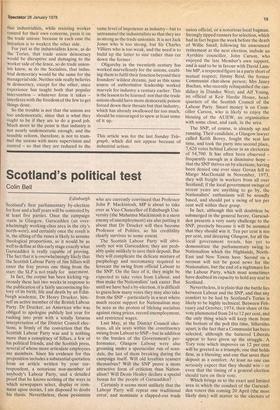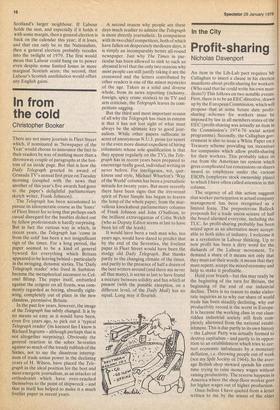Scotland's political test
Colin Bell
Edinburgh Scotland's first parliamentary by-election for four and a half years will be contested by at least five parties. Once the campaign starts in Glasgow, Garscadden (an overwhelmingly working-class area in the city's north-west), and certainly once the result is in, the sifting of the runes is likely to assume theological proportions, so it would be as well to define at this early stage exactly what Garscadden is really capable of proving. The fact that it is overwhelmingly likely that the Scottish Labour Party of Jim Sillars will enter the fray proves one thing from the start: the SLP is not ready for interment.
In fact, the corpse has been kicking vigorously these last two weeks in response to the publication of a fairly unconvincing history of its birth, life and death by an Edinburgh academic, Dr Henry Drucker, himself an active member of the British Labour Party. Dr Drucker, an American who was obliged to apologise publicly last year for rushing into print with a totally fatuous interpretation of the District Council elections, is firmly of the conviction that the Scottish Labour Party was and is nothing more than a conspiracy of Sillars, a few of his political friends, and the Scottish press, several of whose more articulate employees are members. Since his evidence for this proposition includes a substantial quotation from an article written by your correspondent, a notorious non-member of anybody's Labour Party, and a detailed proof that he knows nothing of the ways in which newspapers select, display or comment upon stories, I am disposed to doubt his thesis. Nevertheless, those pessimists who are currently convinced that Professor John P. Mackintosh, MP is about to take over as Vice-Chancellor of Edinburgh University (the Mahatma Mackintosh is a stern enemy of unemployment) are also putting it about that Dr Drucker will then become Professor of Politics, so his credibility clearly survives to some extent.
The Scottish Labour Party will obviously not win Garscadden; they are probably quite unlikely to save their deposit. But they will complicate the delicate mixture of psephology and necromancy required to forecast the swing from official Labour to the SNP. On the face of it, they, might be expected to take votes from Labour, and thus make the Nationalists' task easier. But until we have had a by-election, it is difficult to guess how many votes they may also take from the SNP — particularly in a seat where much recent support for Nationalism may be seen as the protest of lifelong socialists against rising prices, record unemployment, and restricted wages.
Last May, at the District Council elections, all six seats within the constituency swung from Labout to SNP —but in addition to the burden of the Government's per formance, Glasgow Labout were also groaning under a spectacular run of scandals, the last of them breaking during the campaign itself. Will old loyalties reassert themselves? Will the SNP prove a more attractive form of criticism than Nationalism? Will Denis Healey declare a special bonus for the people of Garscadden?
Certainly it seems most unlikely that the Labopr Party will repeat one traditional error, and nominate a clapped-out trade union official, or a notorious local bagman. Strongly tipped runners for selection, which had in fact begun the week before the death of Willie Small, following his announced retirement at the next election, include an Ayrshire councillor, John Carson, who enjoyed the late Member's own support, and is said to be in favour with David Lambie MP, a respected figure in a party short of mutual respect; Jimmy Reid, the former Communist chat-show person; Mrs Janey Buchan, who recently relinquished the candidacy in Dundee West; and Alf Young, an official at Keir Hardie House, headquarters of the Scottish Council of the Labour Party. Smart money is on Councillor Carson, who is likely to enjoy the blessing of the AUEW, an organisation with some clout, and cash, in the area.
The SNP, of course, is already up and running. Their candidate, a Glasgow lawyer called Keith Bovey, fought the seat last time, and took the party into second place, 7,626 votes behind Labour in an electorate of 54,700. It has often been observed — frequently enough as a dismissive hope — that the SNP thrives on by-elections; having been denied one ever since Govan fell to Margo MacDonald in November, 1973, they will freight in workers from all over Scotland; if the local government swings of recent years are anything to go by, the Nationalists' enthusiasm will be soundly based, and should put a swing of ten per cent well within their grasp.
In fact, although this will doubtless be submerged in the general furore, Garscad den presents a very nasty challenge to the SNP, precisely because it will be assumed that they should win it. Ten per cent is ten per cent, and decaying Glasgow, for all the local government trends, has yet to demonstrate the parliamentary swing to Nationalism which the Highlands, North East and New Towns have. Second on a recount will not be good news for the Nationalists, but the end of a nightmare for the Labour Party, which must sometimes have doubted its capacity to hold any seat in Scotland.
Nevertheless, it is plain that the battle lies between Labour and the SNP, and that any comfort to be had by Scotland's Tories is likely to be highly technical. Between February and October, 1974, their share of the vote plummeted from 24 to 12 per cent, and the only thing which will keep them from the bottom of the poll this tithe, Sillarsites apart, is the fact that a Communist has been selected, although the battered Liberals appear to have given up the struggle. A Tory vote which improves on 12 per cent will be greeted as a triumph; one that holds firm, as a blessing; and one that saves their deposit as a comfort. At least no one can seriously expect that they should win — or even that the timing of a general election should turn on their vote.
Which brings us to the exact and limited area in which the conduct of the Garscad den voters this coming 20 April (the most likely date) will matter to the electors of Scotland's larger neighbour. If Labour holds the seat, and especially if it holds it with some margin, then a general election is back on the calendar this year; if it loses, and that can only be to the Nationalists, then a general election probably recedes into the twilight of 1979. The first would mean that Labour could hang on to power even despite some limited losses in more marginal Scottish seats; the second, that Labour's Scottish annihilation would offset any English gains.



































 Previous page
Previous page